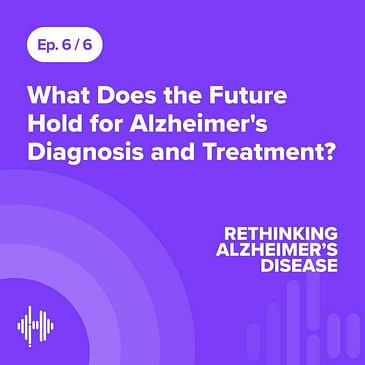Alzheimer’s disease is a complicated condition, but researchers are continuing to make important breakthroughs in our understanding of it. In this episode of the "Rethinking Alzheimer's Disease" podcast, we explore the new era of hope in Alzheimer's research and treatment.
Scientists and doctors are excited about the advancements in early detection and promising advances that could slow down or even prevent the disease. Dr. Sharon Cohen shares that for the first time, we can detect Alzheimer's in its earliest stages through simple blood tests, known as blood-based biomarkers. This breakthrough makes diagnosis more accessible and affordable, revolutionizing how we approach Alzheimer's care.
Additionally, artificial intelligence (AI) is being used to identify digital biomarkers, such as speech and movement patterns, further aiding in early detection. We also discuss the development of disease-slowing and prevention treatments, emphasizing the importance of clinical trials in bringing these innovations to the public.
Moreover, the podcast highlights the critical need for equity and accessibility in healthcare to ensure that advancements in Alzheimer's research benefit all communities. Jason Resendez from the National Alliance for Caregiving discusses efforts to address disparities in healthcare and make new treatments more accessible.
As we conclude the Rethinking Alzheimer's Disease podcast, this episode brings messages of hope from various contributors. Thanks for your interest in Alzheimer’s and the Rethinking Alzheimer’s Disease podcast.
For links to resources and information covered in this series, visit our website at HealthUnmuted.com/resources
What did you think of this episode? We’d love to hear from you. Please visit healthunmuted.com/feedback to let us know!
Rethinking Alzheimer’s Disease was made possible with support from Eisai Inc.
[01:41] What’s the future of Alzheimer's care?
[02:41] Developments in blood-based biomarkers
[05:11] AI and digital biomarkers
[06:01] What are the advances in Alzheimer's treatments?
[07:36] The importance of clinical trials in Alzheimer’s research
[09:23] Messages of hope
Disclaimer: The content provided in this podcast is intended for informational purposes only. It is not a substitute for professional medical advice, diagnosis, or treatment. Always seek the advice of your physician or other qualified healthcare provider with any questions you may have regarding a medical condition. Never disregard professional medical advice or delay in seeking it because of something you have heard on this podcast. Reliance on any information provided by this podcast or its guests is solely at your own risk.
©2024 Mission Based Media Ltd • April 2024 • AD-M2059






